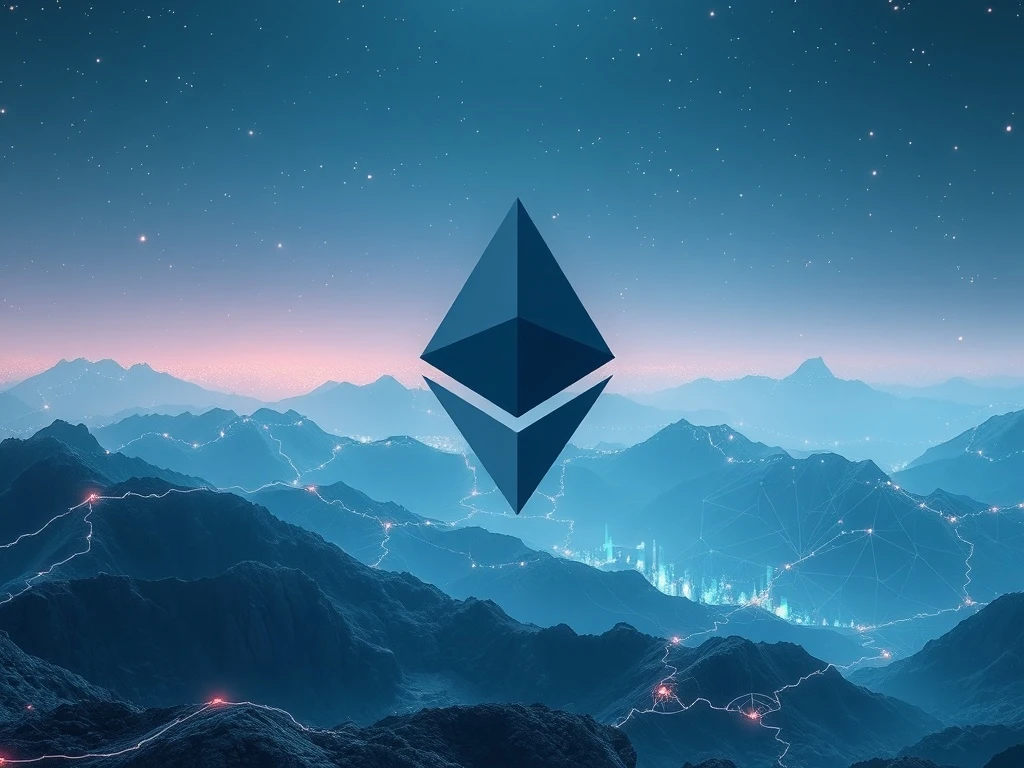Ethereum AI: Revolutionary Integration Driven by Ecosystem Demand

The Ethereum Foundation recently unveiled a new artificial intelligence (AI) team. This development surprised many. It did not feature on the official roadmap. Instead, it emerged from a clear and pressing demand within the Ethereum ecosystem. Davide Crapis, the newly appointed AI team lead, confirmed this. He explained that the move represents a crucial step for the protocol’s long-term success. This proactive approach to Ethereum AI highlights a significant shift.
Ethereum AI: Responding to Ecosystem Demand
Davide Crapis emphasizes the organic growth of the Ethereum AI initiative. He states that ecosystem projects genuinely need this support. Therefore, the Foundation responded to grassroots interest. This wasn’t a top-down policy decision. Rather, it reflects an acknowledgment of existing activity. The Foundation recognizes the potential of AI within its decentralized framework. Consequently, this strategic pivot aims to foster innovation.
The new AI team will operate with a dual focus. It bridges both the protocol and ecosystem divisions within the Ethereum Foundation. This unique structure ensures comprehensive support. It targets product development directly. Furthermore, it prepares Ethereum for broader adoption. This involves traditional AI developers. Their participation is key to future growth. The team will work to integrate AI capabilities seamlessly.
Davide Crapis Leads the Charge for AI Integration
Davide Crapis spearheads this ambitious new venture. He brings a clear vision for the team’s objectives. Initially, the team comprises Crapis himself, an AI product manager, and a dedicated AI staff member. This core group will conduct vital research. They will collaborate closely with existing protocol teams. Their work focuses on practical applications. This foundational structure enables focused development.
The team’s mission extends beyond internal development. It seeks to attract traditional AI developers to the blockchain space. Crapis believes Ethereum offers unique advantages. These advantages address common AI challenges. Developers can find value in decentralization. It offers solutions for AI alignment, verification, and governance. Therefore, showcasing these benefits forms a core strategy for AI integration.
Advancing AI Integration: Attracting Traditional Developers
The value proposition for traditional AI developers is compelling. Decentralization offers inherent transparency. This helps verify AI models. It also aids in ensuring ethical AI alignment. Furthermore, blockchain can provide robust governance mechanisms for AI. These features solve critical problems. They offer a secure and verifiable environment. Such an environment is crucial for complex AI systems. Thus, Ethereum aims to become a preferred platform.
Already, various AI products and services are emerging within the Ethereum ecosystem. These include innovative micropayment solutions. Many utilize stablecoins for efficient transactions. On-chain identity and verification systems also gain traction. These applications demonstrate real-world utility. They showcase the practical benefits of combining AI with blockchain technology. The ecosystem is actively building.
The newly formed dAI team will provide essential clarity and support in these areas. They will help projects navigate technical challenges. They will also offer guidance on best practices. This support will streamline development. A more detailed roadmap is coming later this year. It will include specific milestones. This plan will outline future initiatives. It promises structured progress for AI integration.
ERC-8004: A Cornerstone for Ethereum AI
A significant short-term focus for the team is ERC-8004. This Ethereum Improvement Proposal introduces a trustless method. It allows discovery, selection, and interaction with AI agents. This proposal represents a foundational step. It enables more robust AI applications on Ethereum. Trustless interaction is vital for decentralized AI. It ensures transparency and security.
ERC-8004 was co-authored by Davide Crapis. Marco De Rossi, MetaMask’s AI lead, also contributed. Jordan Ellis from OpenAI joined them. The proposal quickly gained significant traction. Crapis states it can be very impactful. It offers a standardized way for AI agents to operate. This standardization fosters broader adoption. It creates a more interoperable environment. The proposal addresses a key need.
The Broader Landscape of Blockchain and AI
The Ethereum Foundation is not the first to explore this intersection. Other crypto protocols have also ventured into AI. Planck, an infrastructure protocol, launched a layer-0 blockchain for AI in July. Kite AI introduced an AI-focused layer-1 blockchain for Avalanche in February. These initiatives demonstrate a growing trend. The convergence of AI and blockchain is undeniable.
Crypto AI agents proliferated on blockchain rails throughout 2023. These autonomous agents perform various tasks. They can complete financial transactions. They also manage other complex operations. Importantly, they require minimal human supervision. This autonomy represents a significant advancement. It showcases the power of decentralized AI. The ecosystem is evolving rapidly.
The Ethereum Foundation’s Strategic Timing in AI
Some might consider the Ethereum Foundation a late entrant to the AI race. However, Davide Crapis disagrees with this assessment. He believes the timing feels precisely right. Crapis explains that experimentation has been ongoing. People have coordinated AI on these protocols for about two years now. This period allowed for learning and refinement. Therefore, the Foundation enters with valuable insights.
This calculated timing allows Ethereum to build upon existing knowledge. It leverages prior community efforts. The Foundation can now formalize support. It can provide structure for burgeoning projects. This approach ensures more robust and sustainable development. It avoids premature commitments. Instead, it focuses on well-informed strategies. The ecosystem benefits from this measured approach.
The Ethereum Foundation’s move into AI marks a pivotal moment. It signifies a demand-driven evolution. Davide Crapis leads this critical initiative. The focus remains on empowering the ecosystem. Key developments like ERC-8004 promise significant advancements. This strategic AI integration will attract new talent. It will also solidify Ethereum’s position. The future of decentralized AI looks incredibly promising on Ethereum.










